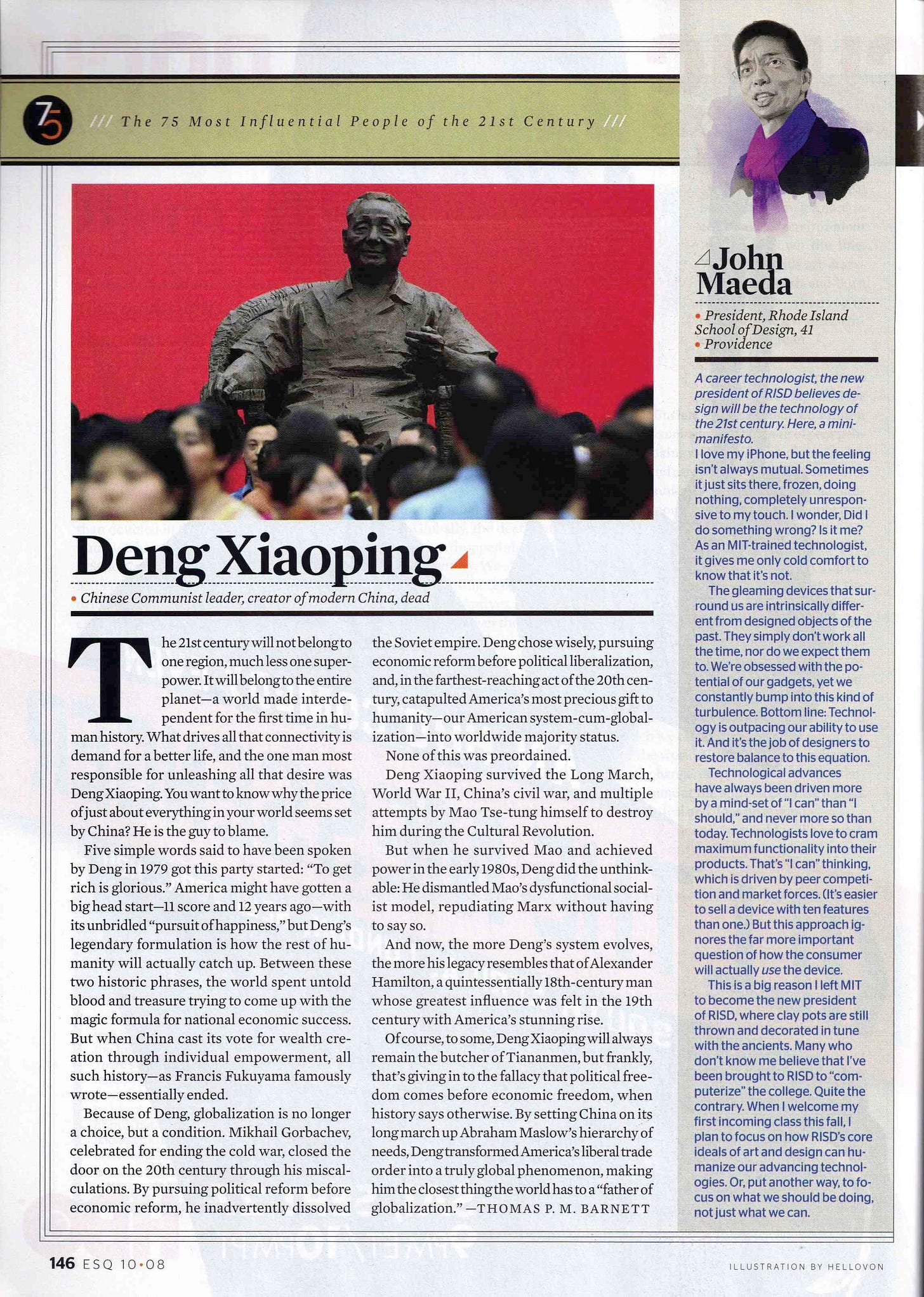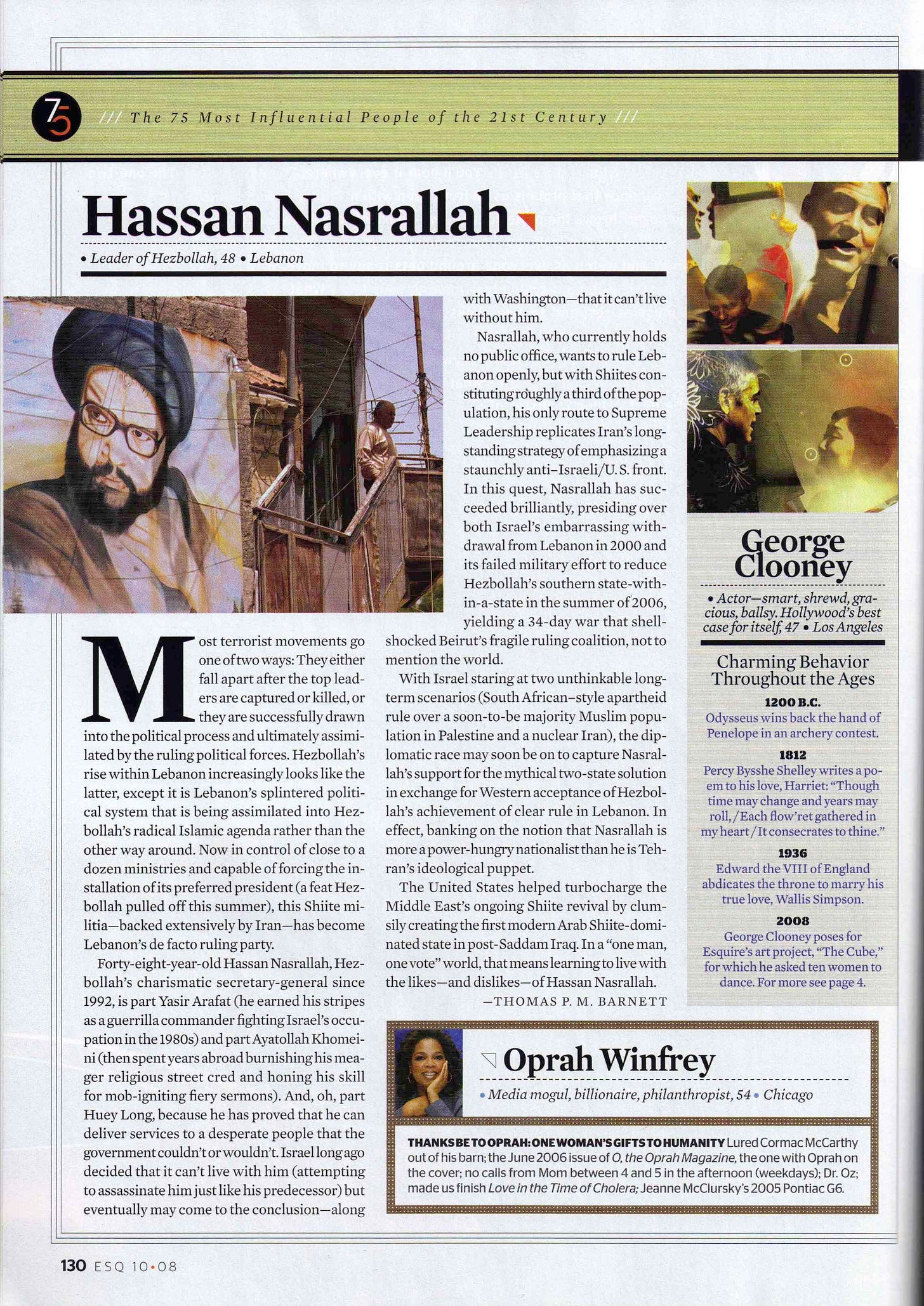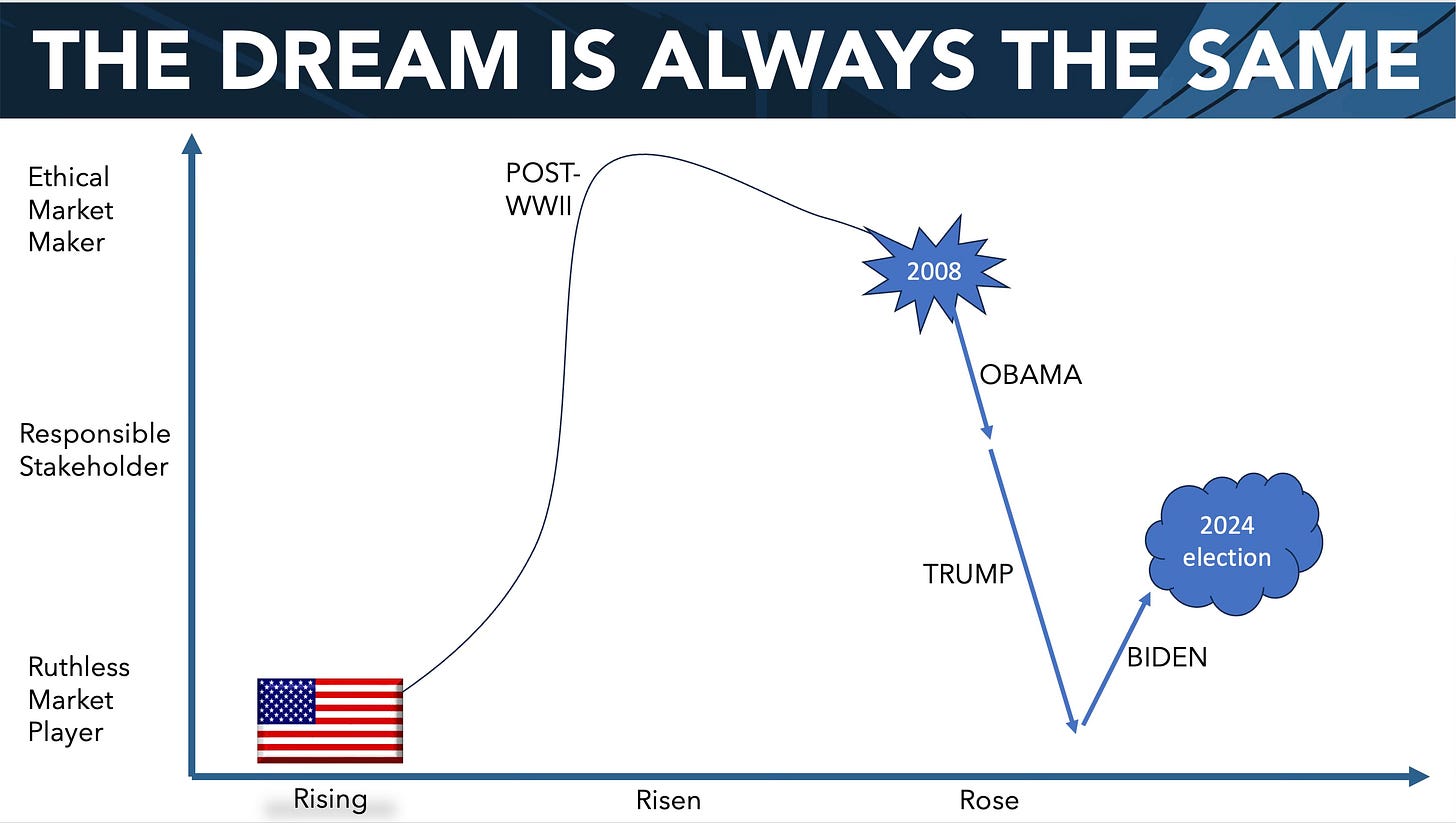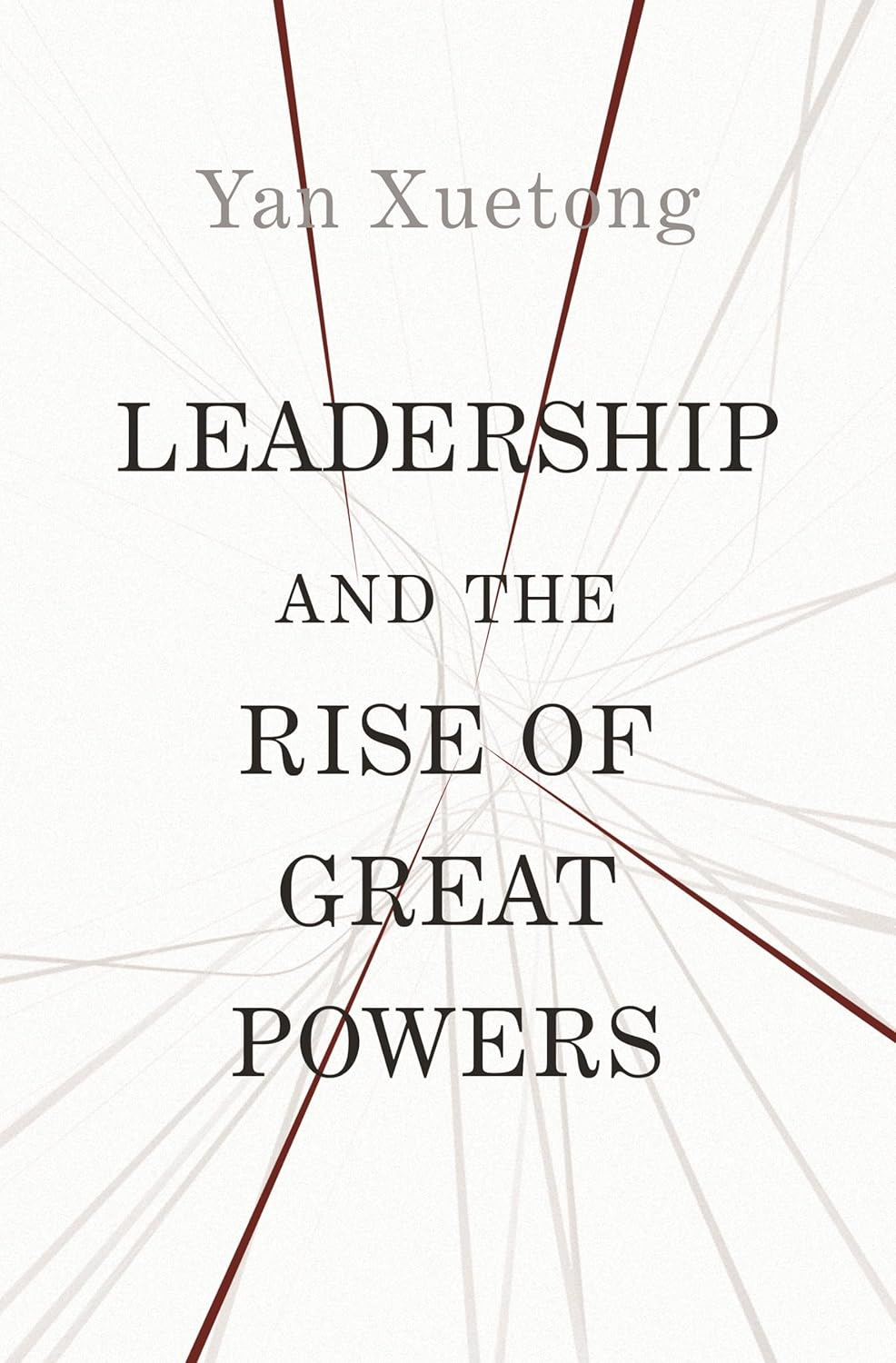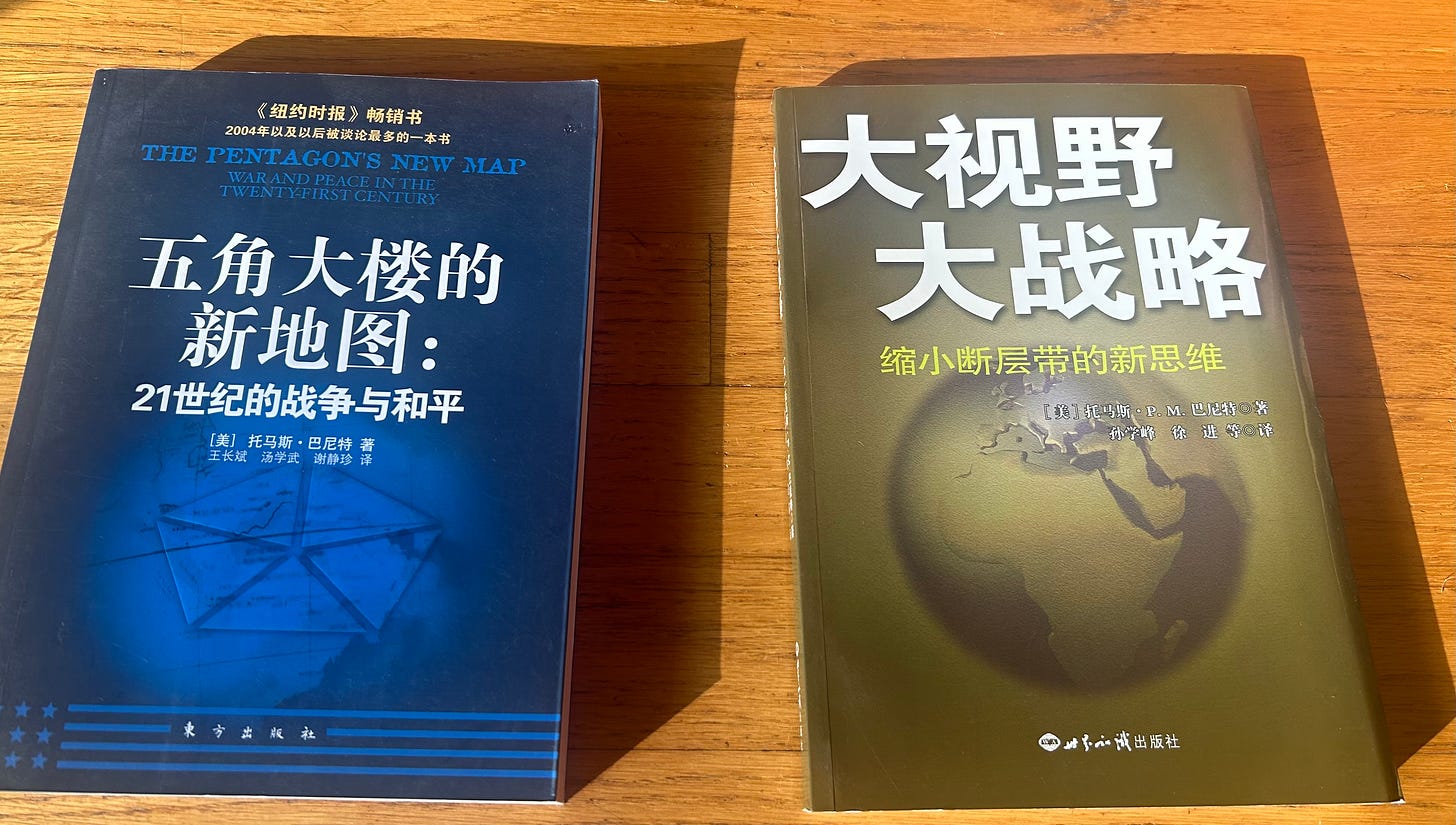The case for Chinese global leadership
There is no denying Beijing's role in North-South integration
This was China’s message at the UN General Assembly recently: we represent the Global South.
There are many good reasons why no one should lightly scoff at this notion.
First, there is the reality of China’s economic rise and how central that rise has been in creating and sustaining today’s global economy.
From 1979 to 2023, China's economic growth averaged 8.9 percent annually, far exceeding the average global economic growth of 3 percent during the same period.
China's average annual contribution to world economic growth was 24.8 percent, ranking first in the world.
In short, China’s rise was peak globalization, or the period of its most rapid and comprehensive expansion. China, in the form of Deng Xiaoping (the most important dead guy of the 21st century, I once labeled him in Esquire, when I also wrote up Hasan Nasrallah), chose to marketize its economy and join the global economy and that is the biggest change to the system this past half-century — hands down.
As I wrote in America’s New Map:
China’s strength is its economic success in building and maintaining its middle class, for which the South evinces enormous respect.
Meanwhile, America is torn asunder over its middle class’s growing sense of vulnerability and disbelief in the nation’s economic future, with patriotism plummeting among our younger generations.
Worse, as we grow older and more consciously “whiter” (i.e., White Christian Nationalism), we present an even less attractive image to the Global South (overwhelmingly non-White and non-Christian), which, coming under climate change’s various devastations, is desperately seeking models, allies, paths forward, opportunities for belonging in bigger and better groups, etc.
Second, there is the structural reality that, as much as India wants the same “crown” as spokesperson and leader of the Global South, New Delhi needs China’s cooperation in its own rise. China has been the big saver in the system these past several decades. That foreign direct investment capacity (so well demonstrated by the Belt & Road Initiative) must flow into India to marshal sufficient resources for its rapid urbanization and industrialization.
China also “owns” major portions of global value chains. While the US is now frantically seeking to “de-risk” those wherever it can, the Global South most assuredly is not. One does not push away a life preserver when trying to stay afloat.
In short, China is selling a vision of North-South integration, largely of its own making, while the US is signaling retreat from the global economy and retrenchment into protectionism — the dreaded Trumpism that will clearly survive Trump himself.
As I have noted here in the past: America was the market-maker in the system from 1945 to 2008’s Great Recession. Since then we have elected nation-building-at-home presidents (Obama, Trump, Biden) and have largely eschewed any role in promoting global trade integration — just the opposite. Instead of re-injecting just enough market-playing, I’m-in-this-for-myself vibes to rebalance our global posture between looking out for the world and looking out for ourselves, we Americans naturally go overboard in our reaction. We cannot merely adjust; we must pull a 180 and denounce all that came before (Globalization was a lie!). It’s just how we be.
If you’re the Global South, looking for safe ways “in” before climate change ravages your environment and tax base, do you simply wait around hoping for a change in vision and attitude from those crazy, self-obsessed Americans? Or do you take the Chinese package of Belt and Road and Safe Cities and their stealthy creation of an info-sphere into which they pull your economy and populace toward their firm cyber grasp (Smile for the camera!)?
Of course you take the latter. You have no idea how long the Americans will be lost to their own manias, whereas China keeps building and connecting and talking up your cause.
Why this matters in ways we don’t pay attention to (from America’s New Map):
For a longer-term expression of Beijing’s ongoing effort to revise global rules, we turn to Yan Xuetong—dean of Tsinghua University’s Institute of International Relations—and his 2019 book, Leadership and the Rise of Great Powers.
Yan is the Joseph Nye of Chinese political science — a personal friend and a great person. His graduate students translated two of my books for publication in China, stepping in himself to make happen what otherwise wasn’t going to happen due to the CCP’s censorship demands (You mentioned Taiwan! Remove entire chapter!).
Continuing …
In [his book], Yan proposes a rising China can overtake far wealthier (per capita) America as the world’s dominant power. His highly Confucian argument: superior national leadership projecting superior moral authority abroad. By efficiently ruling at home through progressive reforms, Beijing’s leaders have, in his estimation, closed the power gap with America.
But what closed that gap even more, in Yan’s analysis, has been the inferior quality of America’s political leadership, specifically their inability to effect necessary domestic reforms. Hard to argue there.
Think about it: Whatever policy shortfalls China has suffered these past, say, 25 years, just compare how those have been processed by the global community versus the tumultuous shifts in US policies over the same time period. In my judgment, we look like irrational nuts while Beijing looks like some Buddha of economic enlightenment.
Thus, China’s growing advantage in political leadership capability gives it greater “strategic credibility” as a global leader. While American political leadership yo-yos between withdrawal (Barack Obama, Joe Biden), aggression (George W. Bush), and erratic untrustworthiness (Donald Trump), Beijing’s current ruler, Xi Jinping, appears a paragon of stable progress. Per this logic, Xi’s deep embrace of dictatorship is excusable as a necessary means to those greater ends of stability and credibility.
In Yan’s analysis, China’s growing leadership advantage, along with its consistently improving standing vis-à-vis the United States, allows for a new type of international leadership to emerge, one based on “humane authority” instead of brute force (e.g., US military power). In time, this new international authority can generate new international norms and a new international structure. China does not have to defeat America militarily; it must consistently outperform it on global authority and leadership by being more dependable, trustworthy, and moral.
Easy to counter with the notion that America represents true democracy while China is lost to authoritarianism, but when you compare what our agenda asks of fragile governments in the Global South versus what China asks of them, Beijing’s is clearly the more attractive (as in, easier to implement) path:
Steeped in ancient Chinese political thought, Yan’s theory makes the best of an admittedly poor hand: he acknowledges China’s lack of (a) election-driven democracy; and (b) separation of executive, legislative, and judicial powers. He argues that since such absences are contradicted by his nation’s rise, then clearly it must be credited elsewhere—namely, to its superior political leadership. By following ancient Chinese principles and practices (“rites” as he calls them), Beijing’s leaders have strengthened their nation-state, which in turn commands great global respect. Consider it a rites-make-might-makes-right approach. Meanwhile, America’s political system produces leaders of low moral character—again, a tough criticism to deflect nowadays.
Hurts, don’t it?
So let’s punch back, alright?
If, as an American, you reject Yan’s claim of China’s superiority in “governmental morality,” I totally agree that we win in a head-to-head comparison— not even close. But dismissing Yan’s argument outright would be a mistake. Operating under the benevolence of US-style globalization, China lifted hundreds of millions of its citizens out of poverty they had long endured. There are moral consequences of such a profound economic accomplishment.
Here’s the truly negative image we now present to the world: ultimately there is no hope for the West’s middle class, which, as it descends over time, will increasingly agitate to the point of civil strife/war. Thus, America’s future is a dead-end and not to be emulated.
That is a very dangerous vibe, and Beijing (plus Putin) is working that angle with true cleverness and vigor while we continue to self-immolate over such “world-shaping” issues as transgender bathroom rights. Our culture wars are killing our global standing just as the Global South could most use it.
You may also bristle at Yan’s casual assumption of America’s inability to once again reform itself across another Progressive Era we so desperately need. But what should really disturb you is Yan’s assumption that, over time, China offers any nation in this world something far better than America ever could: personal security through steady economic progress and social order— however brutally, invasively, and arbitrarily enforced. For a recently elevated global middle class, these are not trivial offerings. So, ask yourself: How does America beat that package? Or is it simply the case that it is now China’s turn to rule the world?
Our mindset right now is contain the nasty East! And that East now comprises — more in our imagination than in reality — this fearsome foursome that is Iran-standing-on-North-Korea’s-shoulders-standing-on-Russia’s-shoulders-standing-on-China’s-shoulders and hence too many feet tall for us to handle without a HUGE military buildup because we’ve seen this movie before!
Meanwhile, the East is integrating the South, with little competition from the West with its “small yard, high fence” approach to protectionism.
But here’s the deal (and by the way) … I’m being serious here, people!
Keep reading with a 7-day free trial
Subscribe to Thomas P.M. Barnett’s Global Throughlines to keep reading this post and get 7 days of free access to the full post archives.





